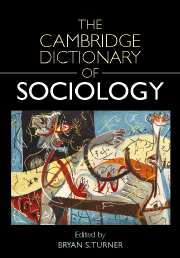R
Published online by Cambridge University Press: 22 October 2021
Summary
race and ethnicity
These terms are political constructs that have been used to classify humans into ethnic groups (see ethnicity and ethnic groups) based on socially significant and identifiable characteristics. These groupings, in turn, have worked to structure societies and regulate social relations. Race generally refers to genetically transmitted characteristics popularly associated with different human groups (such as skin color, facial features, hair texture, body type, and so forth), while ethnicity is generally used to distinguish between groups with a salient array of culturally acquired characteristics (such as language, religion, or nationality). However, the use of the two terms has been less than uniform. Some scholars have conceived of race as a dimension of ethnicity and/or use the terms interchangeably. Others have conceptualized race as a phenomenon or quality theoretically and substantively distinct from ethnicity.
The history of race and ethnicity as analytical constructs, indeed, reveals a lack of consensus in the literature and in popular discourse. Ethnicity, for instance, is a relatively new term that emerged in the 1920s and 1930s. Because the term connotes a set of cultural characteristics often associated with immigrants from specific nations, it traditionally has been linked to perspectives predicting the eventual melting away of ethnic differences as immigrants settle into their new national homes, or to perspectives predicting and/or advocating the mediation of these differences by universalistic political principles. The notion of race, by contrast, is much older. While there is much disagreement about the historical origins of race as a political phenomenon, distinctions have been made between human groups for centuries, based on their continents of origin and on phenotypical traits popularly associated with these environmental contexts (for example Europe, Asia, Africa, North America, and South America). Adding to the confusion, perhaps, the term race has also been used for millennia to describe specific cultural groups that today are more commonly referred to as ethnic groups (for example biblical references to “races”).
Regardless of how the relationship between race and ethnicity is conceived, it should be underscored that both phenomena are socially constructed. That is, both race and ethnicity acquire their meanings and register their impacts through social interaction – through contact and competition between racially and/or ethnically defined groups embedded in specific social contexts.
- Type
- Chapter
- Information
- The Cambridge Dictionary of Sociology , pp. 490 - 527Publisher: Cambridge University PressPrint publication year: 2006



